When Jessie Dress of Austin, Texas started the project Fa(t)shion February for Femmes and Friends, she was responding to what she perceived as a gap in the online community celebrating “fatshion,” or fashion for fat-identified people. She explains, “I don’t feel like the fatshion blogs I see really represent the kind of radical queer fashion that I’m into and that feels like my community.” Jessie committed to posting “outfits of the day” (OOTD) every day in February. Her intention was to celebrate and draw attention to three kinds of politicized fashion projects – first, fatshion; second, the fashion of femme-identified queers; and finally, the fashion of allies of both fat and femme-identified people.
The result was Fa(t)shion February for Femmes & Friends – an inclusive space for posting OOTD for those who find themselves outside the mainstream fashion ideal. What started as her small personal project with a close group of friends has since exploded, with over 350 people participating in some way – a number that grows by the day:
Fa(t)shion February participant Gazel (of Gazelma)
The aim of the project is to “queer” fashion in a number of ways – to celebrate the subversive possibility of fashion. What’s exciting about how the Fa(t)shion February project has developed is the many different ways this aim has been realized. For example, an amazing conversation has emerged through the project regarding the “fat experience.” Fa(t)shion February was created to be explicitly inclusive of those who are often missing from the fatshion dialogue – that is, individuals on the fattest end of the fat spectrum. This privileging of “bigger fats” is an attempt to further radicalize the fatshion phenomenon, but it has come with its own set of dilemmas. Some users expressed fear of participation because they aren’t “fat enough” or aren’t fat-identified. In response to a conversation on The Rotund, Jessie wrote on her tumblr,
The kinds of difficult – but incredibly important – dialogues that are happening in and around the project are part of what makes it succeed in its mission to use fashion as a tool of social activism and community building.
[The rest of the post is after the jump just because it’s somewhat long.]
In addition to creating a space for these kinds of representations, the Fa(t)shion February project intends to celebrate and recognize queer and femme fashion. As do many of the project participants, Jessie defines femme as a gender identity, a “radical and intentional” way of doing gender. This is in contrast to the way femme has been perceived elsewhere — as a stereotypical and heteronormative complement to “butch.” Instead, as Leah Lakshmi Piepzna-Samarasinha pronounced in a 2008 keynote address to Femme Con, “Femme is about finding a way to be a girl that doesn’t hurt.”
Fa(t)shion February participant Bevin (of Queer Fat Femme)
Another important aspect of femme identity that has been asserted in the project’s space is that femme identity isn’t exclusive to people assigned female at birth or who identify as women:
Fa(t)shion February participant Reid (of Dirties Do Fa(t)shion!)
Aside from body and gender politics, a discussion has emerged from the tumblr about challenging and resisting the inevitable commodification and commercialization that comes along with attention to fashion. User Sassyfrass Circus asks,
Can we divorce our sartorial resistance from the psychological rush of finding the one cute dress on the rack that zips or even an entire store of clothes in your size (and conversely, the psychological crash of searching fruitlessly for a single item that fits), no matter what the social, political, or environmental implications of our consumption?
Sassyfrass points out an important limitation of the radical potential of projects like Fa(t)shion February — “the ever-present imperative to shop, to fall to the inevitable model of: Here is a picture of what I wore. Here is where you can buy it.”
That said, one of the fantastic things about the fashion that has predominated on Fa(t)shion February is the amount of thrifting/remixing/self-creating that is going on. Jessie laments, “As a femme, it’s really something I hear a lot – that dressing well has to be expensive, especially if you are fat.” For her, another facet of the radical possibilities of Fa(t)shion February is the way that users are dispelling this myth through creative sartorial strategies. Further, Jessie likes that “people are comfortable posting in jeans and a t-shirt – especially for fatties, and female-identified folk, that can be really hard.”
As Jessie herself is quick to point out, not all marginalized people are being equally represented in the project. The current typical user is white, urban, able-bodied, female-bodied, female/woman-identified, and around a US clothing size 18-22. While there are people of color contributing regularly to the project, they are underrepresented amongst the site’s images. Jessie says she would love to see more people over size 24, people of color, trans and genderqueer people, and differently-abled bodies in the project. In many ways, the missing virtual voices mimic “real life” limits of community – such marginalization is an issue Jessie and others contend with in their political and community organizing outside the internet. The limitations of the virtual space add another potential barrier in terms of access to both the internet and to virtual social networks, through which news of the project has spread. However, it might also offer a way of bringing together geographically isolated individuals who might not otherwise have an opportunity to engage in the critique.
Fa(t)shion February participant: Demi Monde (of Inspiring Demimonde)
I asked Jessie if she was considering extending the project beyond February, given its popularity, and while she’s still working out what form that extension might take, she says she’s like to “keep engaging with people about the project and how it has affected them.”
Catherine Connell is an assistant professor of sociology at Boston University. Her research interests include gender, sexuality, and organizations. Her current project focuses on the identity negotiations of gay and lesbian teachers in California and Texas, states with disparate policies regarding LGBTQ employees.
————————–
UPDATE (from Gwen): While we always like to encourage discussion at Soc Images, some comments have crossed the line from commenting on the topic of the post to ridiculing participants. I’m monitoring the comments as closely as I can to delete any personal attacks on the individuals pictured here, etc.
UPDATE 2: Comments closed. I simply can’t be on top of every comment or moderate the comments post constantly to try to keep people on useful discussions or to quickly catch any personal attacks, etc. Sorry, and maybe I’ll open them again later. Maybe not.

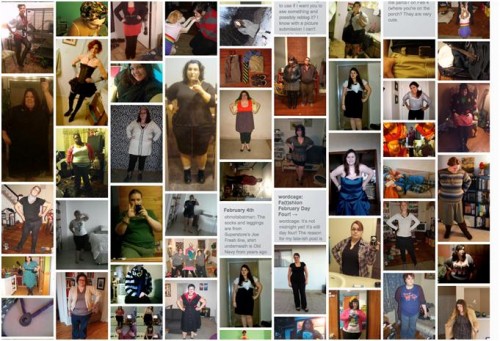
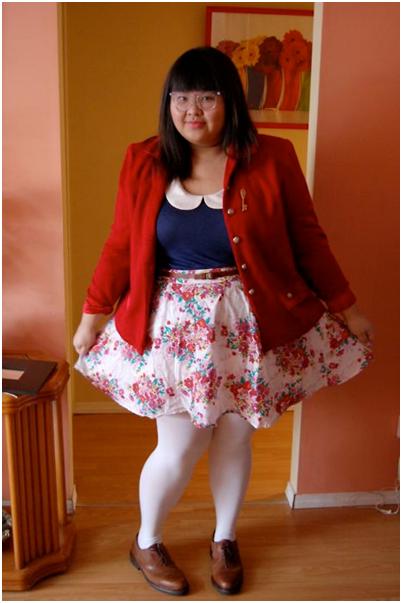
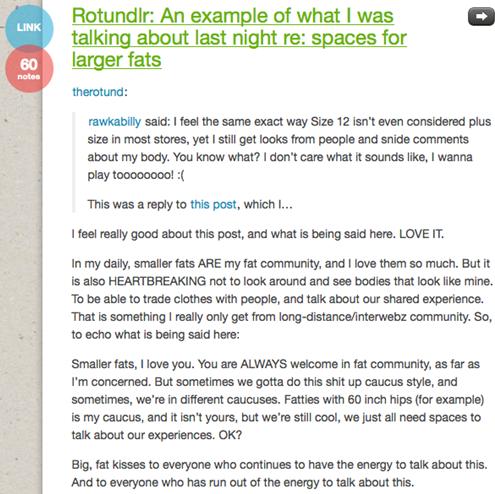
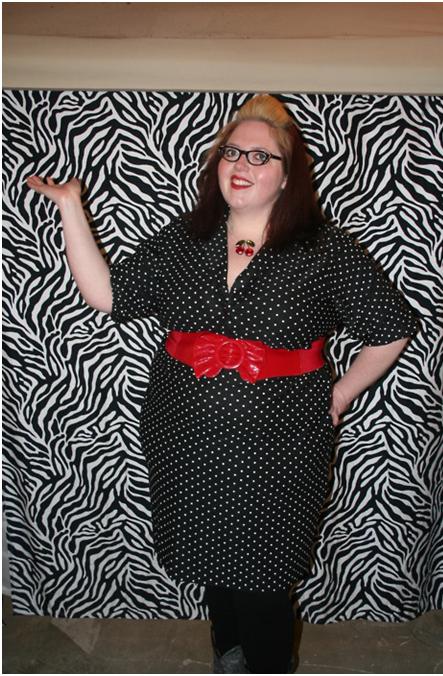
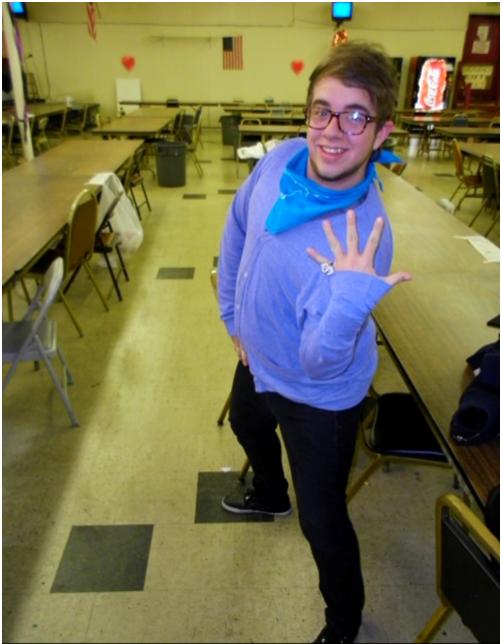
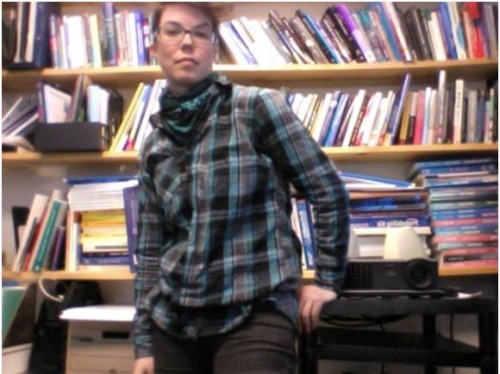
Comments 95
Dave — February 20, 2011
Fa(t)shion? Has anyone looked around? (In the U.S.) It might not be in the media, but everyday all we see is overweight people. The last thing we need is fa(t)shion, we need healthy eating and exercise. Sorry to be blunt, but people would live a lot better and it'd even be possible to feed more people, but that's the problem with capitalism, and that's another conversation.
Bagelsan — February 20, 2011
Do you mean the person in the periwinkle sweater and glasses? From the sentence above the photo, I think that was an example of a person who does not identify as a woman participating (please correct me if I'm wrong.)
April — February 20, 2011
I've always been obsessed with clothes.
For a long time, I felt terribly guilty about this. I thought it was un-feminist to be so vain, and didn't allow myself to buy new clothes very often, even secondhand. Every time I bought something, I felt awful, even if I loved the item of clothing.
A handful of years ago, I realized that that attitude was stupid. Clothing is just another way to express yourself. It's a kind of art. And it's fun as hell, especially when you like buying things secondhand or making them yourself.
Fashion and style belong to everyone, and it doesn't have to mean following trends or giving a rat's behind what other people think.
Here's to people finding the perfect item in their size the next time they go out browsing!
$ocraTTTe$ — February 20, 2011
Wait a second here, so we've now got a movement that is celebrating the physical consequences of food-addiction and trying to paint the disease of obesity as beautiful?
You know a group of people that are even more marginalized than fat people? Methamphetamine users. Maybe they should start their own fashion movement that celebrates rotting teeth and emaciated, track-marked arms.
Ironically, the denizens of the actual fashion world look like a bunch of strung-out junkies, so this isn't really a joke.
Gluttony is a deadly sin for a reason. Obesity kills. Celebrating a lifestyle that is unhealthy is unwise and irresponsible. The super skinny models on our catwalks are no exception; doing so much blow that you turn into a walking skeleton is not something that our magazines and tv programs should celebrate. But that doesn't mean celebrating obese bodies when we're in the middle of a health epidemic is a good idea.
Most fat people in this country are fat because of food addiction, not because of thyroid problems or anything else (if you have medical reasons for being fat that's a totally different story). This isn't much better than creating a movement that celebrates alcoholism or addiction to heroin by fetishizing jaundiced skin and glazed over, pin-point pupiled eyes.
$ocraTTTe$ has spoken
T — February 20, 2011
So... folks that dress themselves like a 3 year old does when they pick out their own clothes, this is "subversive fashion"?!
Also, is the goal to *emphasize* the fatness? Wear undersized clothing and creating fun shapes with the squishy bits?
This post and the accompanying links are a window into a very confusing world...
Erin Leigh — February 20, 2011
The person identifies as femme, which is NOT the same thing as identifying as a woman.
Erin Leigh — February 20, 2011
I am SO THRILLED that the trolls have come out to talk about how bad the fat fatties are, instead of focusing on the content of the post.
Please, let's judge bodies. Let's judge people's style. JUDGING IS SO FUN, YOU GUYS!!!!!!!!!!!!! Way more fun than talking about the impetus to consumerism, or the politics of body policing, or the fabulously complicated world of gender identity.
Anonymous — February 20, 2011
Reid and Demi are so skinny. I'm confused. And, to be honest, I don't think Reid is dressing femme at all. I think he just felt entitled to have his image included for some strange reason, perhaps to see if he could use his male privilege to insert his skinny, not-femme-just-hipster self into this space.
Ester — February 20, 2011
Yeah, women, know your place! You need to be worrying about how fat you are so that you don't worry about the "manly" things like politics and patriarchal world domination.
(That's sarcasm, for the trolls whose minds are CLEARLY blown by the idea of accepting others as they are.)
:[ — February 20, 2011
Seriously though, what's going on with the deleting and reordering of comments?
Treefinger — February 20, 2011
"How dare you compare a fat person who chooses to harm themselves and the rest of society with a person who has a disablilty over which they had no control."
I dare because fatness is not 100% a choice, just as physical disabilities are not 100% thrusted upon everyone that has them.
People who get fat usually require suitable genetics in addition to overeating (and indeed not even all fat people have to do that to become fat). I'm sure you've known thin people who ate terribly and often, as well as fat people who starved themselves and got no thinner. I think here of my dad, who was on the maple syrup diet for two months and didn't lose an ounce.
A tiny minority of physical disabilities are actually deliberately caused (look up Body Integrity Identity Disorder). But a lot of people with physical disabilities can choose to undergo physical therapy or not that can make their situation "better" (in terms of long-term health and whether they can become closer to able-bodied). A lot of those people, like my grandmother, choose not to do that, for a variety of reasons (for instance, it can cause a lot of pain to some, while others might find that using mobility aids is better for them personally than trying to work on getting around without them). These are valid choices for the disabled person to make about their own bodies, but also they also show that disabled people do have some agency about their bodies. Suicide and euthanasia among disabled people can also be a reaction to their bodies, rarely. It might be "wrong to suggest through killing yourself that disabled people live horrible lives", but ultimately they are dealing with their own bodies and choices.
Moreover, fatness and disability are two of the most closely related marginalized states. Mordbidly obese people often become functionally "disabled" through overeating, while those who suffer from chronic pain or use mobility devices can grow fat due to a difficulty in exercising. The categories overlap so often, as is the case in public discourse around supermarket scooters, that it is foolish to divide them into two mutually exclusive categories, and cast fatness as a decadent Satan and the disabled as helpless angels.
"You are same sort of apologist who will weep for the pedophile, and compare it with other forms of sexual identity."
I believe that pedophilia is a form of sexual attraction no more or less influenced by socialization than other sexual identities, and feel very sorry for people who feel pedophilia, if that's what you mean. That doesn't stop me from thinking that pedophilia should not be encouraged or socially sanctioned (because it harms children) or that child molesters are horrible people.
The difference between that (and people who go around spreading HIV) and obesity is that obesity does not harm society. The only way you could suggest that it does is "predisposing your children to follow an unhealthy lifestyle" (assuming the parents got fat through following an unhealthy lifestyle). I believe it is a responsibility for parents to teach their children the value of health and encourage healthy eating and exercise. If the child grows up to be fat anyway, whether due to genetics or their rejection of health as a priority, then whatever. The parents have not "failed". They taught their children the right things, but in the end the child grew up and made their own choice about what to prioritize. Children do tend to grow up and have independent beliefs from their parents.
Look at the people in the post, really look at them. They are not morbidly obese. Most are just carrying a couple dozen extra pounds. Will learning to see them as beings with creativity, sexuality and aesthetic interests produce an atmosphere in which the pressue is to be fat, and not thin? Probably not, because I have never seen a fat activist say that fat bodies should be privileged above thin bodies- more that weight should be considered irrelevant where beauty is concerned.
And even if it DID cause more people to become fat, the unhealthy kind? I would still support it. I would rather live in a world where people died a little early and had a few health problems, but didn't heckle, attack and bully others for a feature that says nothing of their moral character, than one in which it's considered acceptable to break someone emotionally in order to keep them physically healthy.
Scott — February 20, 2011
So, on the bottom of all of these unproductive comments, allow me to plug my buddy's photo story on a Retro Curves Fashion Show a couple years ago in Austin, TX.
http://chroniclingofdays.blogspot.com/2009/10/retro-curves-fashion-show.html
Cheers.
nix — February 20, 2011
OMG! An opportunity to play fat hate bingo! Thanks so much, concern trolls!
Christina — February 20, 2011
I didn't take the time to read every single comment, ten were about enough to take a jab at my self-esteem.
I am overweight, and yes, consider myself to be fat. However, I have lived my entire life with severe hypothyroidism. As if the years of severe undiagnosed depression, unexplained lethargy, and stunted growth weren't enough, I regularly have to deal with misconceptions about my work ethic and eating habits because being overweight is another one of my symptoms.
I know someone did make a passing comment about people with legitimate medical problems, so I probably shouldn't take offense. But I am judged on a daily basis because of this one aspect of my appearance, and frankly, it hurts. Maybe we need to just stop generalizing. I am sure that some overweight people are that way because of unhealthy lifestyle choices. But I'm also sure that many just happen to have that body type, despite healthy eating and exercise habits.
In my opinion, this blog is inspiring to healthy, overweight people like me. There are a lot out there, and they should not be silenced simply because some people on the internet find the fact that they don't fit into a size eight offensive.
Von — February 20, 2011
Whow, how the prejudices and biases pop out! By the way paedophiles are sociopaths, it's not a lifestyle choice, there is no cure or treatment and they prey on innocent children.Not pretty!
Great to see people taking back their fatness as ok and enjoying their clothes and how they look whoever they are and whatever their orientation.We all have a right to have fun and not be judged by others.Unless of course we're breaking the law or hurting others.
holizz — February 20, 2011
Conservatives moralise about sex, "liberals" moralise about food.
(Paraphrased from: http://www.ted.com/talks/jonathan_haidt_on_the_moral_mind.html and "liberals" in quotes because being anti-fat is illiberal.)
Keiko — February 20, 2011
Wow. The fucking trolls are ridiculous.
I bet they didn't even LOOK at the blog. They just saw the words "fat" and then went on a rampage. Most of the people on that blog are average sized, but because of our media's ridiculously high standards they are more comfortable to categorize themselves as "fat."
Concern trolls, you're fucking making the problem worse.
Kelly — February 21, 2011
Wow - I love this post! Thank you so much for posting, and to Catherine as well. And thank you for mod'ing too.
Elisa — February 21, 2011
I guess this is a critique that I've often been having of sociology of late, but I have to agree with Sassyfrass-- it's hard for me to get excited about movements that focus on one/ a few "radical" perspectives without considering what I see as the whole gamut. . . for example, it's great that this site is offering a critiques of our heteronormative, gender-policing, sexist and body-image patroling/anti-fat world . . . but the medium of fashion is limiting.
I guess it's not fair to expect people to be "radical" in all ways just because they identify outside of the societally-accepted norm in some ways, but there's no serious critique of consumerism here (except for that one comment) or capitalism, and I think that's dangerous. Seeing buying things and "fashion" as an avenue to escape some sorts of oppression is hard, especially when that buying most likely directly contributes to the suffering of others-- who made those clothes and how much did they get paid? The site's creator notes that not all marginalized people are represented in the project-- but aren't there more issues of race etc to worry about when the clothes worn might be made by poor women of color in maquiladoras in Mexico?
I don't know. . . perhaps this type of "partial" analysis is just the way that identity politics goes? I know that the limitations of fashion as a radical medium don't keep this phenomena from being a sociological image. . . but I'm worried about the "limitations" being solely a thrown-in side comment.
Fox — February 21, 2011
Oh my god. This is the saddest comments page I have ever seen on SI. I wish there was some way to screen comments so that if certain phrases were picked up (like "eat too much," "food addiction," "lazy," "get off their asses," "go to the gym") it would automatically just direct the commenter to a page explaining the science of fat and statistics on dieting and social/economic/class situation in America (have these trolls READ any other posts here? Or do they skip over any to do with food?).
I understand not wanting to censor discussion, but these nasty and ignorant comments have completely derailed the conversation, and I imagine that anyone coming here from the Fatshion project is just going to be hurt. Why don't you trolls go find some posts on conservation efforts and bitch about how it's the animals' fault they're endangered? Or maybe a local child is having a birthday party you could go ruin.
Erika — February 21, 2011
I try not to read the comments really often to things like this, dealing with the "fat" demon of the day. Mostly, because I'm fat (I have always been fat. And tall. And of the darker-skinned variety. I mean, perhaps you'd like some other ammo since you like to attack the traits of other people. I hear being a certain race or social class puts you at more risk for disease. Maybe you can belittle people about that too, and be REALLY SUPER HELPFUL...)And this certainly stings. It chips away at the faith I have in other people to be kind, intelligent beings. There again, it chips away at the humanity of us all.
It is worse than any other topic. The research doesn't back up the hate. We are collectively fatter than ever, and healthier than ever (and it isn't just the jump in technology, it spans further than that). And there is some evidence pinpointing growing girth as a way to protect those who have high amounts of stress hormone in their blood (seen first in baboons, who all share the same diet, and whose top males eat more and first, but the lower-ranking males were the ones who became obese and died earlier: they are social animals that structure their society a bit similar to our own). But it is just a part of the picture. And we are only getting started. It's interesting research really, and might tone down the hate-mongering quite a bit.
I've never been able to do it. To hate someone I didn't know because of their body, skin color, etc... I can't fathom what it takes to be that sort of thing, and I don't want to.
The bad news (for you) is, we aren't going away. The movement to stop the hatred and persecution of people who don't look the same climbs like a vine over the wall you build to separate.
Don't use a logical fallacy to defend yourself, it's the mark of an idiot. A flimsy defense at best...like fat people cost you money (the nerve! Paying for someone else's HEALTH. You know what, I don't mind paying taxes that help to get healthcare for other people. I. Really. Don't. Isn't that the ideal? To each give a little so that all can have plenty?) if they die early. Either they die early (saving you money) or they don't (and cost you money) but are not that unhealthy.
You can not tell what is going on inside a person's body just by looking at the outside.
Yes, we need more healthy food. But you don't have to attach fat people over it. You can help that good fight by going to higher-ups and suppliers. (Fat people didn't STEAL the healthy food).
Yes, we need more places to be active. You also can't attack fat people over this. And it is also a good fight to be taken to someone else.
These things should be provided for everyone (like...oh...I don't know, healthcare...).
This is a post about a marginalized group's effort toward beauty. And I'm for that. I'm so for that, and hope it happens so often, that eventually we have no marginalized groups due to exposure therapy.
-THE END.
guvvuf — February 21, 2011
Resistance is certainly an appropriate tag for this post. Wow some of you.
Frowner — February 21, 2011
Please mod harder, especially about derails--give the trolls one post a month or a week or whatever it takes to repeat that they find fat people ugly, or point out that calories in equals calories out, or that being overweight is the same as shooting heroin and being alcoholic and then shut off the tap. I am thrilled to see posting on Fatshion February, not so thrilled to see the same discussion that happens on every post about fat people. If it didn't happen on every post, in the same mansplanation way every time, it wouldn't be so tiring.
Get into it: Femmes and Friends Fa(t)shion February | Queer Fat Femme — February 22, 2011
[...] did a write-up of the project in the blog Sociological Images. Fatshion February definitely had some limitations in terms of the participants (namely, very few [...]
fa(t)shion february | À l'allure garçonnière — March 20, 2011
[...] have been some shitty comments made on more than one occassion from outside voices on tumblr and other websites where news of fa(t)shion february was shared. namely, someone on tumblr reblogging a photo of a [...]
Favourite Looks from 2011 | Bonjour Gazel — September 6, 2013
[...] it’s lovely. HAHA. No shame in being tacky, ladies and gents. This image even got featured in Sociological Images to my surprise. My classmates told me that they found my picture on that website and I had to [...]